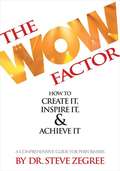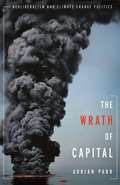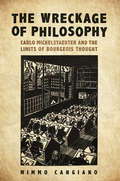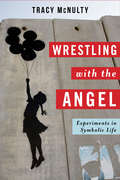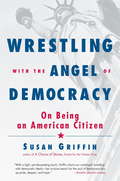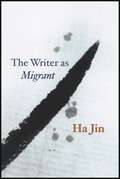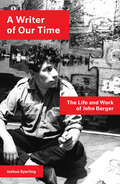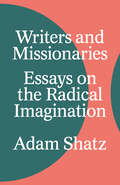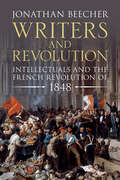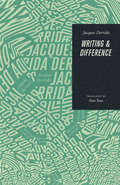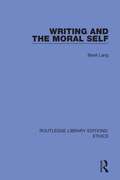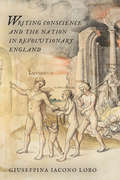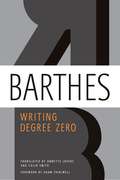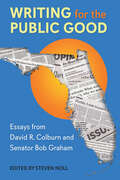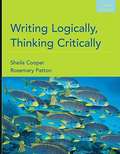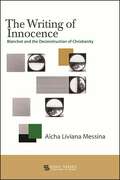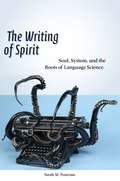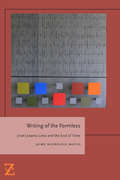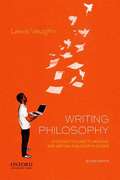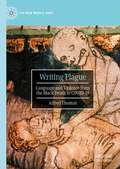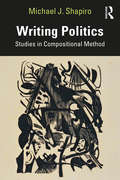- Table View
- List View
The Wow Factor: A Comprehensive Guide for Performers
by Steve ZegreeDr. Steve Zegree of Western Michigan University, choral arranger and conductor of Western Michigan's Gold Company has developed this practical guide for performers, students, teachers and parents which offers fundamental philosophies and concepts that are essential to a person's growth and development and will contribute to a successful professional life in music.
The Wrath of Capital: Neoliberalism and Climate Change Politics (New Directions in Critical Theory #48)
by Adrian ParrAlthough climate change has become the dominant concern of the twenty-first century, global powers refuse to implement the changes necessary to reverse these trends. Instead, they have neoliberalized nature and climate change politics and discourse, and there are indications of a more virulent strain of capital accumulation on the horizon. Adrian Parr calls attention to the problematic socioeconomic conditions of neoliberal capitalism underpinning the world's environmental challenges, and she argues that, until we grasp the implications of neoliberalism's interference in climate change talks and policy, humanity is on track to an irreversible crisis.Parr not only exposes the global failure to produce equitable political options for environmental regulation, but she also breaks down the dominant political paradigms hindering the discovery of viable alternatives. She highlights the neoliberalization of nature in the development of green technologies, land use, dietary habits, reproductive practices, consumption patterns, design strategies, and media. She dismisses the notion that the free market can solve debilitating environmental degradation and climate change as nothing more than a political ghost emptied of its collective aspirations. Decrying what she perceives as a failure of the human imagination and an impoverishment of political institutions, Parr ruminates on the nature of change and existence in the absence of a future. The sustainability movement, she contends, must engage more aggressively with the logic and cultural manifestations of consumer economics to take hold of a more transformative politics. If the economically powerful continue to monopolize the meaning of environmental change, she warns, new and more promising collective solutions will fail to take root.
The Wreckage of Philosophy: Carlo Michelstaedter and the Limits of Bourgeois Thought (Toronto Italian Studies)
by Mimmo CangianoThe work of Carlo Michelstaedter (1887–1910) was the first to analyze modernist philosophy in strict connection with social changes in mass society. Revealing how Michelstaedter was able to unveil the relations between pivotal early-modernist philosophies and social restructurings, The Wreckage of Philosophy examines the ongoing processes of "specialization," "rationalization," and "atomization." It points out how Michelstaedter connected the main theoretical expressions of modernism with the decisive social transformations of the early twentieth century, taking into consideration the key players of modernist philosophy, such as Friedrich Nietzsche, Henri Bergson, Ernst Mach, and William James. By following Michelstaedter’s analysis and strategies, The Wreckage of Philosophy focuses on several intertwined issues: the distinct philosophical positions within the modernist area; the connections between philosophy and modernist literature; the relations between intellectual positions and social upheavals; and the early-twentieth-century links among traditional philosophy, critique of language, and epistemology of technique.
Wrestling With an Angel: Power, Morality, and Jewish Identity
by Ehud Luz Michael SwirskyAfter the Bar Kokhba revolt (132-135 CE) and the eradication of all trace of Jewish political independence in Palestine, Jews gave little thought to questions of war. Long exile freed them from the sharp moral dilemmas con¬fronted by any polity that is compelled to use force to defend itself. Jews considered warfare to be the ''craft of Esau,'' that is, a matter for the gentiles, at least until such time as the Messiah would come. The Jews --''Jacob'' -- took no interest in armed conflict except insofar as it might impinge upon their fate as a minority living under foreign rule.
Wrestling with Democracy
by Dennis PilonThough sharing broadly similar processes of economic and political development from the mid-to-late nineteenth century onward, western countries have diverged greatly in their choice of voting systems: most of Europe shifted to proportional voting around the First World War, while Anglo-American countries have stuck with relative majority or majority voting rules. Using a comparative historical approach, Wrestling with Democracy examines why voting systems have (or have not) changed in western industrialized countries over the past century.In this first single-volume study of voting system reform covering all western industrialized countries, Dennis Pilon reviews national efforts in this area over four timespans: the nineteenth century, the period around the First World War, the Cold War, and the 1990s. Pilon provocatively argues that voting system reform has been a part of larger struggles over defining democracy itself, highlighting previously overlooked episodes of reform and challenging widely held assumptions about institutional change.
Wrestling with the Angel: Experiments in Symbolic Life (Insurrections: Critical Studies in Religion, Politics, and Culture)
by Tracy McNultyWrestling with the Angel is a meditation on contemporary political, legal, and social theory from a psychoanalytic perspective. It argues for the enabling function of formal and symbolic constraints in sustaining desire as a source of creativity, innovation, and social change.The book begins by calling for a richer understanding of the psychoanalytic concept of the symbolic and the resources it might offer for an examination of the social link and the political sphere. The symbolic is a crucial dimension of social coexistence but cannot be reduced to the social norms, rules, and practices with which it is so often collapsed. As a dimension of human life that is introduced by language—and thus inescapably "other" with respect to the laws of nature—the symbolic is an undeniable fact of human existence. Yet the same cannot be said of the forms and practices that represent and sustain it. In designating these laws, structures, and practices as "fictions," Jacques Lacan makes clear that the symbolic is a dimension of social life that has to be created and maintained and that can also be displaced, eradicated, or rendered dysfunctional. The symbolic fictions that structure and support the social tie are therefore historicizable, emerging at specific times and in particular contexts and losing their efficacy when circumstances change. They are also fragile and ephemeral, needing to be renewed and reinvented if they are not to become outmoded or ridiculous. Therefore the aim of this study is not to call for a return to traditional symbolic laws but to reflect on the relationship between the symbolic in its most elementary or structural form and the function of constraints and limits.McNulty analyzes examples of "experimental" (as opposed to "normative") articulations of the symbolic and their creative use of formal limits and constraints not as mere prohibitions or rules but as "enabling constraints" that favor the exercise of freedom. The first part examines practices that conceive of subjective freedom as enabled by the struggle with constraints or limits, from the transference that structures the "minimal social link" of psychoanalysis to constrained relationships between two or more people in the context of political and social movements. Examples discussed range from the spiritual practices and social legacies of Moses, Jesus, and Teresa of Avila to the political philosophy of Hannah Arendt and Jacques Rancière. The second part is devoted to legal and political debates surrounding the function of the written law. It isolates the law's function as a symbolic limit or constraint as distinct from its content and representational character. The analysis draws on Mosaic law traditions, the political theology of Paul, and twentieth-century treatments of written law in the work of Carl Schmitt, Walter Benjamin, Sigmund Freud, Pierre Legendre, and Alain Badiou. In conclusion, the study considers the relationship between will and constraint in Kant's aesthetic philosophy and in the experimental literary works of the collective Oulipo.
Wrestling with the Angel
by Tracy McnultyWrestling with the Angel is a meditation on contemporary political, legal, and social theory from a psychoanalytic perspective. It argues for the enabling function of formal and symbolic constraints in sustaining desire as a source of creativity, innovation, and social change.The book begins by calling for a richer understanding of the psychoanalytic concept of the symbolic and the resources it might offer for an examination of the social link and the political sphere. The symbolic is a crucial dimension of social coexistence but cannot be reduced to the social norms, rules, and practices with which it is so often collapsed. As a dimension of human life that is introduced by language-and thus inescapably "other" with respect to the laws of nature-the symbolic is an undeniable fact of human existence. Yet the same cannot be said of the forms and practices that represent and sustain it. In designating these laws, structures, and practices as "fictions," Jacques Lacan makes clear that the symbolic is a dimension of social life that has to be created and maintained and that can also be displaced, eradicated, or rendered dysfunctional. The symbolic fictions that structure and support the social tie are therefore historicizable, emerging at specific times and in particular contexts and losing their efficacy when circumstances change. They are also fragile and ephemeral, needing to be renewed and reinvented if they are not to become outmoded or ridiculous. Therefore the aim of this study is not to call for a return to traditional symbolic laws but to reflect on the relationship between the symbolic in its most elementary or structural form and the function of constraints and limits.McNulty analyzes examples of "experimental" (as opposed to "normative") articulations of the symbolic and their creative use of formal limits and constraints not as mere prohibitions or rules but as "enabling constraints" that favor the exercise of freedom. The first part examines practices that conceive of subjective freedom as enabled by the struggle with constraints or limits, from the transference that structures the "minimal social link" of psychoanalysis to constrained relationships between two or more people in the context of political and social movements. Examples discussed range from the spiritual practices and social legacies of Moses, Jesus, and Teresa of Avila to the political philosophy of Hannah Arendt and Jacques Rancière. The second part is devoted to legal and political debates surrounding the function of the written law. It isolates the law's function as a symbolic limit or constraint as distinct from its content and representational character. The analysis draws on Mosaic law traditions, the political theology of Paul, and twentieth-century treatments of written law in the work of Carl Schmitt, Walter Benjamin, Sigmund Freud, Pierre Legendre, and Alain Badiou. In conclusion, the study considers the relationship between will and constraint in Kant's aesthetic philosophy and in the experimental literary works of the collective Oulipo.
Wrestling with the Angel of Democracy: On Being an American Citizen
by Susan GriffinWhat does is it mean to be a citizen of the United States? Susan Griffin's provocative investigation of that question takes us from the Declaration of Independence to the Iraq War, with many stops in between. Her conclusion: democracy is nothing less than a revolution of consciousness, and the revolution has just begun.
The Writer as Migrant
by Ha JinHa Jin's journey from an uneducated soldier in the People's Liberation Army in China to a resident of the United States raises questions about language, migration, and the place of literature in a globalizing world.
A Writer of Our Time: The Life and Work of John Berger
by Joshua SperlingThe first intellectual biography of the life and work of John BergerJohn Berger was one of the most influential thinkers and writers of postwar Europe. As a novelist, he won the Booker prize in 1972, donating half his prize money to the Black Panthers. As a TV presenter, he changed the way we looked at art with Ways of Seeing. As a storyteller and political activist, he defended the rights and dignity of workers, migrants, and the oppressed around the world. “Far from dragging politics into art,” he wrote in 1953, “art has dragged me into politics.” He remained a revolutionary up to his death in January 2017.Built around a series of watersheds, at once personal and historical, A Writer of Our Time traces Berger’s development from his roots as a postwar art student and polemicist in the Cold War battles of 1950s London, through the heady days of the 1960s—when the revolutions were not only political but sexual and artistic—to Berger’s reinvention as a rural storyteller and the long hangover that followed the rise and fall of the New Left.Drawing on first-hand, unpublished interviews and archival sources only recently made available, Joshua Sperling digs beneath the moments of controversy to reveal a figure of remarkable complexity and resilience. The portrait that emerges is of a cultural innovator as celebrated as he was often misunderstood, and a writer increasingly driven as much by what he loved as by what he opposed. A Writer of Our Time brings the many faces of John Berger together, repatriating one of our great minds to the intellectual dramas of his and our time.
Writers and Missionaries: Essays on the Radical Imagination
by Adam ShatzWhat does it mean to be a politically committed writer?Through a close reading of the lives and works of some of the greatest intellectuals of recent times, Adam Shatz asks: do writers have an ethical imperative to question injustice? How can one remain a dispassionate thinker when involved in the cut and thrust of politics? And, in an age of horror and crisis, what does it mean to be a committed writer?Shatz interrogates the major figures of twentieth and twenty-first century thought and finds within their lives and work the roots of our present intellectual and geopolitical situation. Charting the role of the committed intellectual through the work of Jean-Paul Sartre on the Algerian War and Edward Said's lifelong solidarity with the Palestinian people, to Fouad Ajami's role as the "native informant" for pro-intervention cause in the lead-up to the invasion of Iraq, alongside philosophers and critics Roland Barthes, Jacques Derrida and Claude Lévi-Strauss and the novelists Michel Houllebecq and Richard Wright, each struggled to reconcile their writing and their politics, their thought and their commitments. Writers and Missionaries is an erudite and incisive work of intellectual elucidation and biographical enquiry that demands that we interrogate anew the relation of thought and action in the struggle for a more just world.
Writers and Revolution: Intellectuals and the French Revolution of 1848
by Jonathan BeecherThe revolution of 1848 has been described as the revolution of the intellectuals. In France, the revolution galvanised the energies of major romantic writers and intellectuals. This book follows nine writers through the revolution of 1848 and its aftermath: Alphonse de Lamartine, George Sand, Marie d'Agoult, Victor Hugo, Alexis de Tocqueville, Pierre-Joseph Proudhon, Alexander Herzen, Karl Marx, and Gustave Flaubert. Conveying a sense of the experience of 1848 as these writers lived it, this fresh and engaging study captures the sense of possibility at a time when it was not yet clear that the Second French Republic had no future. By looking closely at key texts in which each writer attempted to understand, judge, criticise, or intervene in the revolution, Jonathan Beecher shows how each endeavoured to answer the question posed explicitly by Tocqueville: Why, within the space of two generations, did democratic revolutions twice culminate in the dictatorship of a Napoleon?
Writing and Difference
by Jacques DerridaFirst published in 1967, Writing and Difference, a collection of Jacques Derrida's essays written between 1959 and 1966, has become a landmark of contemporary French thought. In it we find Derrida at work on his systematic deconstruction of Western metaphysics. The book's first half, which includes the celebrated essay on Descartes and Foucault, shows the development of Derrida's method of deconstruction. In these essays, Derrida demonstrates the traditional nature of some purportedly nontraditional currents of modern thought—one of his main targets being the way in which "structuralism" unwittingly repeats metaphysical concepts in its use of linguistic models. The second half of the book contains some of Derrida's most compelling analyses of why and how metaphysical thinking must exclude writing from its conception of language, finally showing metaphysics to be constituted by this exclusion. These essays on Artaud, Freud, Bataille, Hegel, and Lévi-Strauss have served as introductions to Derrida's notions of writing and différence—the untranslatable formulation of a nonmetaphysical "concept" that does not exclude writing—for almost a generation of students of literature, philosophy, and psychoanalysis. Writing and Difference reveals the unacknowledged program that makes thought itself possible. In analyzing the contradictions inherent in this program, Derrida foes on to develop new ways of thinking, reading, and writing,—new ways based on the most complete and rigorous understanding of the old ways. Scholars and students from all disciplines will find Writing and Difference an excellent introduction to perhaps the most challenging of contemporary French thinkers—challenging because Derrida questions thought as we know it.
Writing and the Moral Self
by Berel LangOriginally published in 1991, this book analyses the relation between writing and ethics in a number of social contexts – in politics, as language discloses its connections to the institutions of totalitarianism and democracy; in the university, as contemporary scholarly ideals find an uncomfortably accurate representation in the stylistic forms of academic writing; in daily social practice, ranging from the status of truth in journalistic writing to the connection between pronouns and affirmative action; and finally in the ethical structure of language itself.
Writing Conscience and the Nation in Revolutionary England
by Giuseppina Iacona LoboExamining works by well-known figures of the English Revolution, including John Milton, Oliver Cromwell, Margaret Fell Fox, Lucy Hutchinson, Thomas Hobbes, and King Charles I, Giuseppina Iacono Lobo presents the first comprehensive study of conscience during this crucial and turbulent period. Writing Conscience and the Nation in Revolutionary England argues that the discourse of conscience emerged as a means of critiquing, discerning, and ultimately reimagining the nation during the English Revolution. Focusing on the etymology of the term conscience, to know with, this book demonstrates how the idea of a shared knowledge uniquely equips conscience with the potential to forge dynamic connections between the self and nation, a potential only amplified by the surge in conscience writing in the mid-seventeenth-century. Iacono Lobo recovers a larger cultural discourse at the heart of which is a revolution of conscience itself through her readings of poetry, prose, political pamphlets and philosophy, letters, and biography. This revolution of conscience is marked by a distinct and radical connection between conscience and the nation as writers struggle to redefine, reimagine, and even render anew what it means to know with as an English people.
Writing Degree Zero
by Roland Barthes Annette Lavers Colin Smith Adam ThirlwellIs there any such thing as revolutionary literature? Can literature, in fact, be political at all? These are the questions Roland Barthes addresses inWriting Degree Zero, his first published book and a landmark in his oeuvre. The debate had engaged the European literary community since the 1930s; with this fierce manifesto, Barthes challenged the notion of literature's obligation to be socially committed. Yes, Barthes allows, the writer has a political and ethical responsibility. But the history of French literature shows that the writer has often failed to meet it--and from Barthes's perspective, literature is committed to little more than the myth of itself. Expert and uncompromising,Writing Degree Zero introduced the themes that would soon establish Barthes as one of the leading voices in literary criticism.
Writing for the Public Good: Essays from David R. Colburn and Senator Bob Graham (Government and Politics in the South)
by David R. Colburn Bob GrahamInsights into modern American politics and society from two of Florida’s most influential public figures Writing for the Public Good presents a selection of over 100 important opinion pieces from David R. Colburn (1942‒2019) and Senator Bob Graham, two of the most influential public figures in contemporary Florida. Spanning 30 years and addressing a wide variety of topics that continue to be relevant today, these essays show the key role of Florida in modern American life and politics and illustrate the power of civic engagement in tackling issues facing the nation.Exemplifying public writing that connects with and informs readers everywhere, these pieces appeared as op-eds in outlets including the Miami Herald, the Tampa Bay Times, the Tampa Tribune, the Orlando Sentinel, the New York Times, the Washington Post, Politico, and Time. With style, intelligence, and thoughtfulness, Colburn and Graham examine subjects including the economy, race relations, public education, the environment, national intelligence, and international affairs. They look to history to give context to the social problems of today, and they point forward to constructive solutions that center on the role of citizen activism.Together, these essays chart the history of modern Florida, reflecting the state’s rise to a Sunbelt powerhouse that is often at the center of national conversations. Colburn and Graham challenge readers to consider and discuss different perspectives on current issues and, above all, to respond. Readers will come away with renewed hope that their actions can make a difference to improve society and will be inspired to work for a better tomorrow.A volume in the series Government and Politics in the South, edited by Sharon D. Wright Austin and Angela K. Lewis-Maddox
Writing Logically, Thinking Critically (6th Edition)
by Sheila Cooper Rosemary PattonThis concise, accessible text teaches students how to write logical, cohesive arguments and how to evaluate the arguments of others. Integrating writing skills with critical thinking skills, this practical book teaches students to draw logical inferences, identify premises and conclusions and use language precisely. Students also learn how to identify fallacies and to distinguish between inductive and deductive reasoning. Ideal for any composition class that emphasizes argument, this text includes coverage of writing style and rhetoric, logic, literature, research and documentation.
Writing Neoliberal Values: Rhetorical Connectivities and Globalized Capitalism (Rhetoric, Politics and Society)
by Rachel C. RiednerThis book examines human-interest stories, unpacking from them violence inherent to neoliberalism, and considers if it is possible to find in these stories hints of people and labour that suggest other narratives.
The Writing of Innocence: Blanchot and the Deconstruction of Christianity (SUNY series, Literature . . . in Theory)
by Aïcha Liviana MessinaThe Writing of Innocence explores the topic of innocence and the peculiar relationship to Christianity in the writing of Maurice Blanchot. Its starting point is that innocence is not a condition relegated to a mythical past but rather one resulting from the construction of the subject in and through language. Hence, we don't lose innocence; instead, we are lost by innocence. It is an excess, not a lack. This inverted notion of innocence raises new ethical and political issues that Aïcha Liviana Messina unfolds through vigorous re-readings of a series of biblical motifs, including law, grace, and apocalypse. The closing chapter turns to the convergences and divergences between Jean-Luc Nancy's and Blanchot's understandings of the deconstruction of Christianity. With a foreword by philosopher Serge Margel, The Writing of Innocence offers a fresh perspective on Blanchot's writings in general and on his dialogue with Hegel in particular. While staging innocence in its philosophical and literary dimensions, The Writing of Innocence provides singular readings of works by Kierkegaard, Agamben, Derrida, Nancy, Camus, Hugo, and Kafka.
The Writing of Spirit: Soul, System, and the Roots of Language Science
by Sarah M. PourciauContemporary thought has been profoundly shaped by the turn toward synchronic models of explanation, which analyze phenomena as they appear at a single moment, rather than diachronically as they develop through time. Nowhere, however, has this transformation unfolded more influentially than in the domain of language science, where the terminology of synchrony and diachrony first explicitly emerges. The Writing of Spirit sets out to demonstrate, through a new history of language science, that we do not know what we think we know about this pivotal juncture in our intellectual past. Twentieth-century linguistic structuralism, it argues, does not replace the historicist approach of the nineteenth century with a more modern, more systematic perspective, as has long been assumed, because the relationship between history and system is structuralism’s point. The real revolution consists not in a turn away from language time, but in a turn toward time’s absolutely minimal conditions, and thus also toward a theory of diachrony, boiled down and distilled. Pourciau arrives at this surprising and powerful conclusion through an analysis of language scientific theories over the course of two centuries, associated with thinkers from Jacob Grimm to the Russian Futurists and from Richard Wagner to Roman Jakobson, in domains as disparate as historical linguistics, phonology, acoustics, opera theory, philosophy, poetics, and psychology. The result is a novel contribution to one of the most pressing questions of our intellectual moment, namely, the question of what role the study of history should play in the interpretation of the present.
Writing of the Formless: Jose Lezama Lima and the End of Time
by Jaime Rodríguez MatosIn this book, Jaime Rodríguez Matos proposes the “formless” as a point of departure in thinking through the relationship between politics and time. Thinking through both literary and political writings around the Cuban Revolution, Rodríguez Matos explores the link between abstract symbolic procedures and various political experiments that have sought to give form to a principle of sovereignty based on the category of representation. In doing so, he proposes the formless as the limit of modern and contemporary reflections on the meaning of politics while exploring the philosophical consequences of a formless concept of temporality for the critique of metaphysics. Rodríguez Matos takes the writing and thought of José Lezama Lima as the guiding thread in exploring the possibility of a politicity in which time is imagined beyond the disciplining functions it has had throughout the metaphysical tradition—a time of the absence of time, in which the absence of time no longer means eternity.
Writing Philosophy: A Student's Guide to Reading and Writing Philosophy Essays
by Lewis VaughnThis second edition of Writing Philosophy, aspires to help philosophy teachers address a big problem--the conflict between trying to teach course content and dealing with students who are ill prepared to write papers on that content. The dilemma is acute because writing is both a valuable teaching tool and a vehicle for assessing understanding. Using class time to explain the unique demands of philosophical writing, however, can divert time and attention from the real meat of a course. This book tries to come as close as possible to the ideal of a brief, self-guided manual that covers the basics of argumentative essay writing and encourages rapid learning with minimal teacher input.
Writing Plague: Language and Violence from the Black Death to COVID-19 (The New Middle Ages)
by Alfred ThomasWriting Plague: Language and Violence from the Black Death to COVID-19 brings a holistic and comparative perspective to “plague writing” from the later Middle Ages to the twenty-first century. It argues that while the human “hardware” has changed enormously between the medieval past and the present (urbanization, technology, mass warfare, and advances in medical science), the human “software” (emotional and psychological reactions to the shock of pandemic) has remained remarkably similar across time. Through close readings of works by medieval writers like Guillaume de Machaut, Giovanni Boccaccio, and Geoffrey Chaucer in the fourteenth century, select plays by Shakespeare, and modern “plague” fiction and film, Alfred Thomas convincingly demonstrates psychological continuities between the Black Death and COVID-19. In showing how in times of plague human beings repress their fears and fantasies and displace them onto the threatening “other,” Thomas highlights the danger of scapegoating vulnerable minority groups such as Asian Americans and Jews in today’s America. This wide-ranging study will thus be of interest not only to medievalists but also to students of modernity as well as the general reader.
Writing Politics: Studies in Compositional Method
by Michael J ShapiroWriting Politics is a methods book designed to instruct on politically focused literary inquiry. Exploring the political sensibilities that arise from the way literary fiction re-textualizes historical periods and events, the book features a series of violence-themed inquiries that emphasize forms of writing as the vehicles for politically attuned historiography. Each investigation treats the way the literary genre, within historiographic metafiction, enables political inquiry. It’s a form of writing that inter-articulates history and fiction to rework a textual past and unsettle dominant understandings of events and situations. Central to the diverse chapters are fictional treatments of authoritarian, fascist, or zealous mentalities. Featured, for example, are Radovan Karadzic (the architect of the Bosnian genocide), Reinhard Heydrich (the architect of the Holocaust’s "final solution"), and the Trotsky assassin Ramon Mercader. Michael J. Shapiro has produced another original and sophisticated bookshelf staple; the only contemporary investigation in Political Studies that instructs on method in this way.
